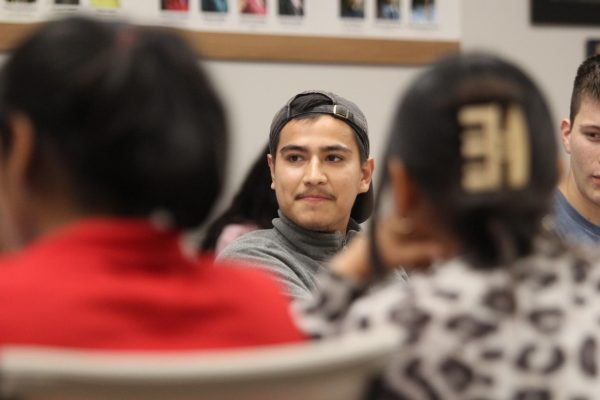A Student Government Divided: Chaos, Lies and Disorder Dominate Student Govt. Proceedings
Vice President Angela Van Gilder (left) and President Christopher Washington (right) lead the weekly Associated Student Government meeting on Tuesday, Sept. 11, 2018.
Christopher Washington, president of the Associated Student Government, turned what was supposed to be a regularly scheduled ASG meeting on Tuesday, Sept. 11, into a tumultuous forum, during which he dragged the student government into a closed session and insisted on a vote to impeach the vice president.
Six days before the closed session, on Wednesday, Sept. 5, Washington and Angela Van Gilder, the vice president he wanted to oust, got into a verbal altercation during a Rampage video interview.
In the video, Washington stated: “Sometimes, you have to break the rules to get stuff done.” At this point Van Gilder interjected, and warned Washington that they could get “shut down” for comments like that.
Washington asserted that he was in the middle of an interview. “This is a profile of the president,” he said. “Are you the president?”
The Rampage reporter then posed a question: “Do you two work well together?”
Washington Seeks Van Gilder’s Removal
The day before the closed session, Washington told The Rampage that he planned to remove Van Gilder as vice president because he has a “conflicted working relationship” with her.
“I believe that presidents and vice presidents are supposed to have a synchronized flow,” Washington said. “I feel like I am being undermined, and people from previous administrations have been backing her agenda.”
Washington also said he believed that some people in the ASG revealed the content of closed meetings to others and cannot be trusted to put ASG ahead of their own personal agenda.
“I want ASG to be ASG matters,” he said. “I don’t want outside people to come in and influence ASG because that’s ASG’s job to influence the students.”
Washington said Van Gilder’s way of handling certain situations is “really off.”
“I do not like the disparaging emails she sends to everyone,” Washington said, adding that Van Gilder’s emails are threatening. Despite promising to share the emails with The Rampage, he has not.
The Closed Session That Wasn’t
During the Sept. 11 ASG meeting, Washington, disregarding ASG bylaws and the Brown Act, moved the meeting into a closed session and ordered the two Rampage reporters out of the room.
The next day, Washington denied moving the meeting to a closed session when asked by a Rampage reporter. Then he asked Symmone Woods, his speech writer, if ASG went into a closed session. Woods said yes.
Washington immediately left the room, only to admit shortly after that he had, in fact, moved the meeting to a closed session and had been caught in a lie.
Later, Woods and Anna Munoz, ASG communications officer, said the minutes of the meeting would show another account of what happened.
Munoz said the meeting had not gone into closed session because that move was never reflected in the minutes. She said, according to the minutes, no reporters were present in the meeting and that Washington was not trying to get anyone removed from their position.
In fact, the minutes of the Sept. 11 meeting show that the ASG did go into closed session.
The minutes reflect that there was a closed session and that a vote to remove Van Gilder from her position did not pass because it did not get two thirds of all votes. The minutes also show that Van Gilder asked for an ethics committee, which is supposed to be appointed for any removal.
The following day, Washington, along with Trae’Monay Kelley, ICC chair, approached The Rampage for a second interview and admitted that the meeting was in fact a closed session.
Washington said that he was no longer attempting to remove Van Gilder from office and that he lied about the closed session meeting to “protect the integrity” of the ASG.
He said he was trying to ensure that ASG’s internal conflicts were not covered in the newspaper. He expressed regret about telling The Rampage about his problems with the vice president.
“It seems like the story so far is that I am a liar. OK, I lied. I lied to protect the integrity of my association; that doesn’t vindicate me from lying, I just lied,” Washington said. “It doesn’t mean that I’m a liar because I told a lie. Liars habitually lie.”
On whether the internal conflict between him and his vice president was affecting how he runs the ASG, Washington refused to comment.
Chaotic, Free-for-All Meeting
A week after attempting to impeach his vice president, Washington used an hour out of the two-hour ASG meeting on Sept. 18 ranting about email exchanges between Van Gilder and Lijuan Zhai, the director of Institutional Research, Assessment and Planning, about the Facilities/Environmental Health & Safety Operations Agreement (FAC/EHS).
Washington projected the emails on a TV screen for the entire meeting to see.
At the heart of Washington’s position was whether the vice president had personally communicated disapproval of the agreement before the body had discussed or made any decisions on the matter.
Trying to get the meeting back on track, Ernie Martinez, ASG adviser, questioned the propriety of bringing up the emails before another agenda item. “Some of us are lost here,” trustee Carlos Rodriguez said. “I think Dr. Martinez is saying that we need to finish the resolution before we move on to the emails.”
Washington continued to discuss the contents of the emails rather than discuss the agreement that the body were scheduled to vote on. Washington said Van Gilder did not use appropriate conduct in the way she speaks to people and that she has a history of being disrespectful.
“I am not the only person who has spoken out of line or shamed other people in this association,” Van Gilder said during the meeting. “So if we are going to talk about that, we need to talk about everybody that has ever done that, if we’re going to have any integrity at all.”
Martinez chimed in to ask that Washington get to the point with the meeting.
Despite the adviser’s attempt to pivot the proceedings back to schedule, the discussions of the alleged misconduct of the vice president continued.
Senator Raezhanique Brown accused Van Gilder of blocking her text messages, and Van Gilder said she did not block anyone, but that she had problems with her phone for some time and was not receiving messages. “I don’t know why we are even discussing this at our meeting,” trustee Rodriguez said. “This just sounds like a personal matter.”
Washington then requested that Rodriguez be removed from the meeting, claiming that he was making intimidating faces and giving off an “attacking vibe.” In an interview with Rodriguez two days after the meeting, he said that Washington was wasting time on his personal feud with his own vice president.
“He’s abusing his power in ASG,” Rodriguez said. “He’s wasting our time trying to remove Van Gilder and not focusing on our students and training our new senators. I think it’s a personal matter that they need to discuss on their own time and leave the ASG out of.”
Van Gilder’s Perspective
Van Gilder said in an interview on Friday, Sept. 14, that Washington had been working to remove her from her position as VP for a couple of weeks. Van Gilder said voting during the closed session meeting did not pass because there was not enough votes. She was concerned that the closed session meeting and his attempts to remove her violated the Brown Act, which guarantees the rights of the public to attend and participate in local government meetings.
Van Gilder explained that law 54957.1 section 5 of the Brown Act specifies the legitimate ways that an organization can go into closed meetings.
According to the rule, certain steps must be taken “to consider the appointment, employment, evaluation of performance, discipline, or dismissal of a public employee or to hear complaints or charges brought against the employee by another person or employee.”
Van Gilder said that the rules apply in her case because she is an elected official, not a public employee. Section D of the Brown Act prescribes the procedure to discuss the appointment, employment and evaluation of performance, discipline or dismissal of a public employee or to hear complaints brought against the employee. It also notes that an elected official is not a public employee.
Van Gilder said she brought these concerns about how the meetings were being run to the executive board of the ASG and Martinez, the adviser, but was told that they would allow the proceedings because it was for discipline.
Van Gilder said the closed session meeting as well as Washington’s attempts to expel her were clear violations of the Brown Act. She said when she brought it up to Washington, he became clearly upset with her. When she brought it to the attention to Martinez, he said he understood, but still allowed the closed session to continue.
Van Gilder said the ASG had also violated bylaws on Sept. 4, when they also went into closed session.
According to bylaws, a two-thirds vote is required to go into closed session. She said that because the organization did not follow the rules, any decisions they made during the session would be null and void.
Van Gilder said she has never been given any information on why she was being disciplined.
Emergency Meeting
On Sept. 17, the ASG came very close to another violation of the Brown Act when Washington sent out a mass email announcing an emergency meeting.
Washington wrote in the email that there were some pressing matters he wished to discuss with the entire ASG and asked them to not invite their adviser or reporters to the meeting.
According to the Brown Act, “an emergency meeting may be called under specific, drastic circumstances — “work stoppage, crippling activity, or other activity that severely impairs public health, safety, or both, as determined by a majority of the members of the legislative body.” A 24 hour notice is not necessary, but a one-hour notification of any news media requesting notice is necessary, if possible.
When Van Gilder pressed Washington about holding an illegal meeting and violating the Brown Act, she said Washington changed it to an informal meeting, but Article IX of the ASG states, “All meetings of the student senate shall be open to the associated student body members and held during regular school hours with the appointed adviser or representative in attendance.
Also, section two of the bylaws states that a special meeting may be called only by a majority vote of the student senate or executive board. No votes on the matter had taken place.
Just 20 minutes before the “informal” meeting, Washington canceled the meeting, stating that his adviser scolded him about for violating ASG’s own rules by trying to exclude him. At no point did Washington explain the meeting’s purpose, according to both Washington and Van Gilder.
Insufficient Training?
Martinez said the executive board has three returning students who have about a year of experience at FCC, and several years experience at other institutions. He said most of the current members are new to FCC, but that it doesn’t necessarily mean they aren’t familiar with the rules or the Brown Act.
“One particular way we increased the association’s knowledge in the past was to include training in each meeting, which I will suggest to do if the agenda will allow for the time,” Martinez said. “We also have a very comprehensive Canvas site, which has multiple areas of study.
Trustee Rodriguez said in an interview that Washington was doing nothing to teach the new senators the Brown Act rules and the bylaws of ASG.
“He’s not pushing us to be trained,” Rodriguez said. “He is just leaving all the newest students in the dark.”
Rodriguez also said he believes that it is not in Washington’s interest for the students to learn the proper rules, “because it will just hinder him [Washington] making the rules that he makes.”
“Last year we [ASG] were really organized,” Rodriguez said. “This year, it is just completely disorganized. We need to be stable and structured, but right now, we are just loose, and whatever Chris says, goes.”

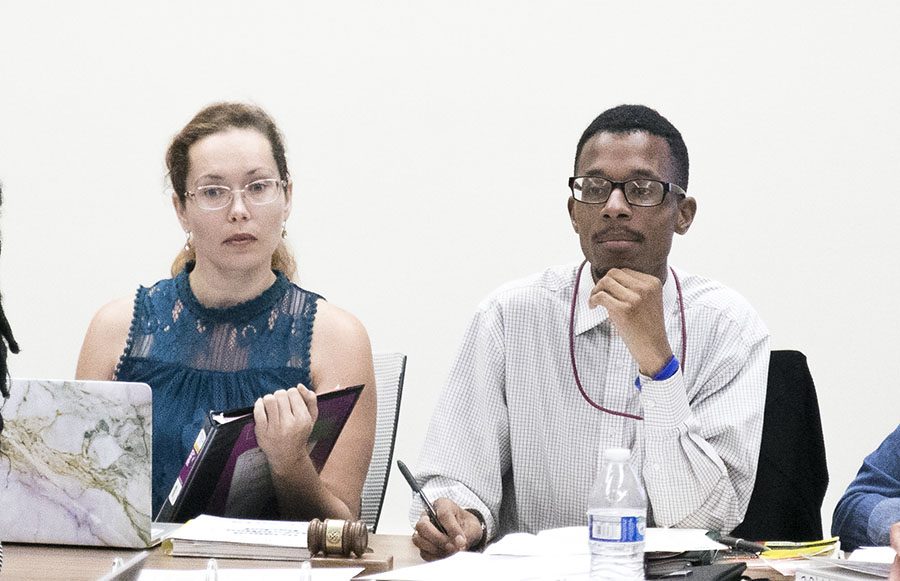
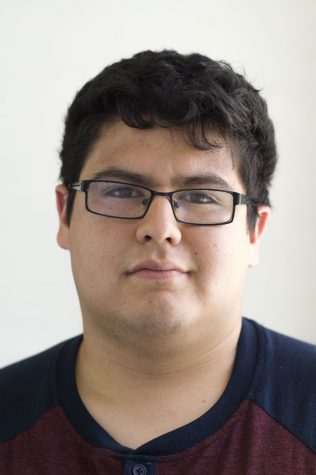




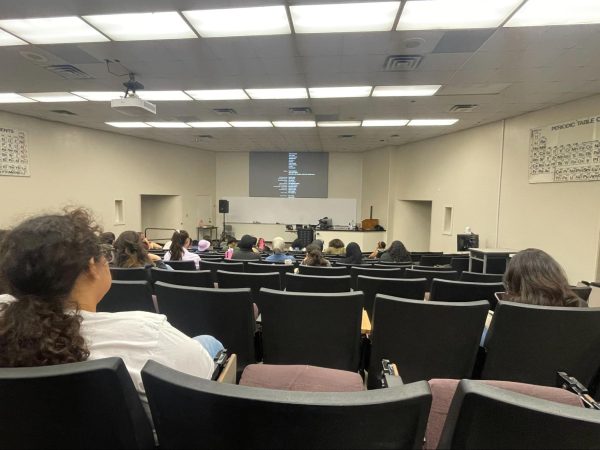
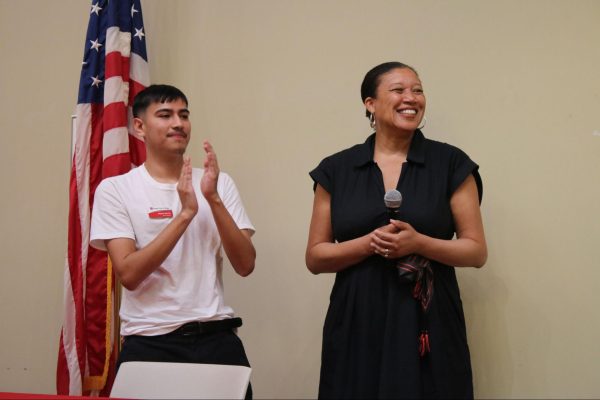
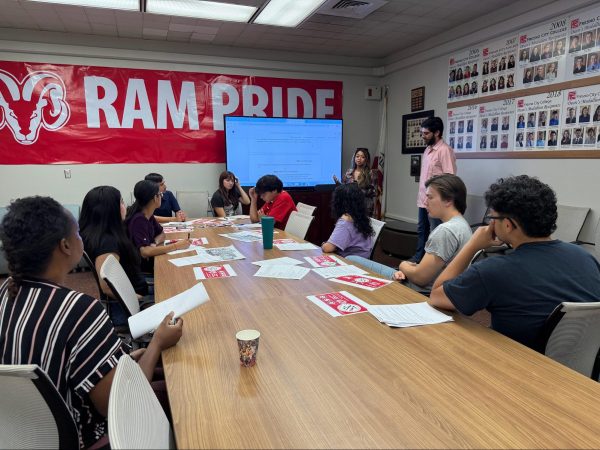
![[From Left to Right] Gurbhagat Bains, Mary Woods, Natalia Montelongo, Reanna Carlson, Miguel Barrita, Gabriel Echeveste, and Vrinda Vrinda gather together to take a group photo after their first meeting in the Fresno City College Senate Chambers on Aug. 19, 2025.](https://www.therampageonline.com/wp-content/uploads/2025/08/image1-copy-8-600x450.jpg)
